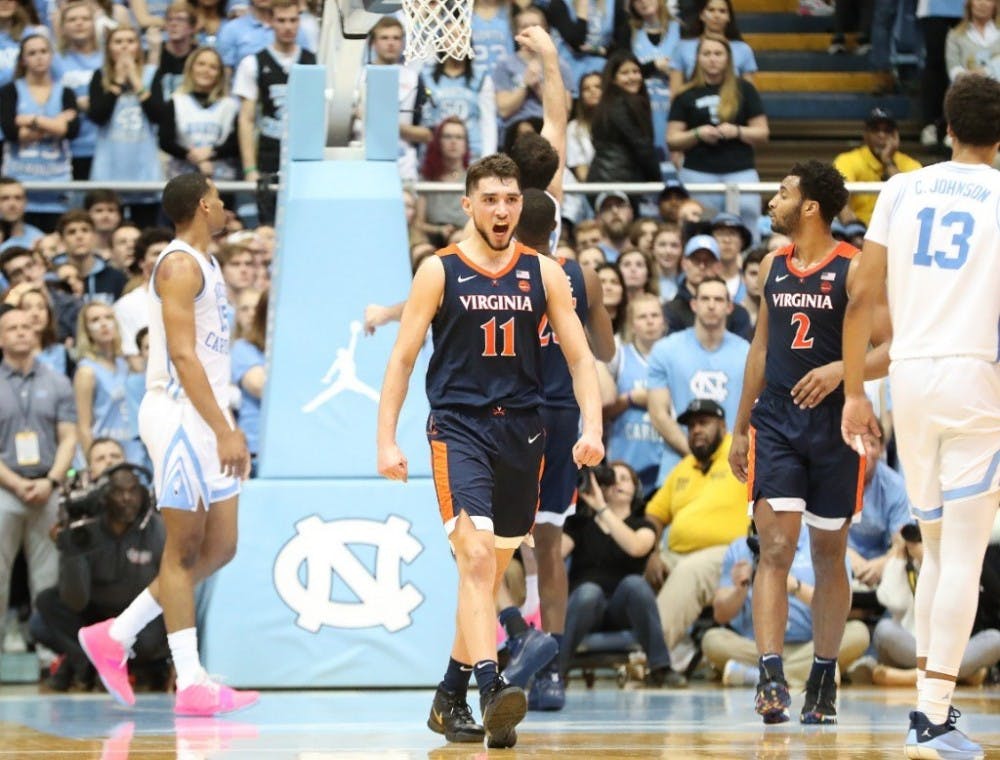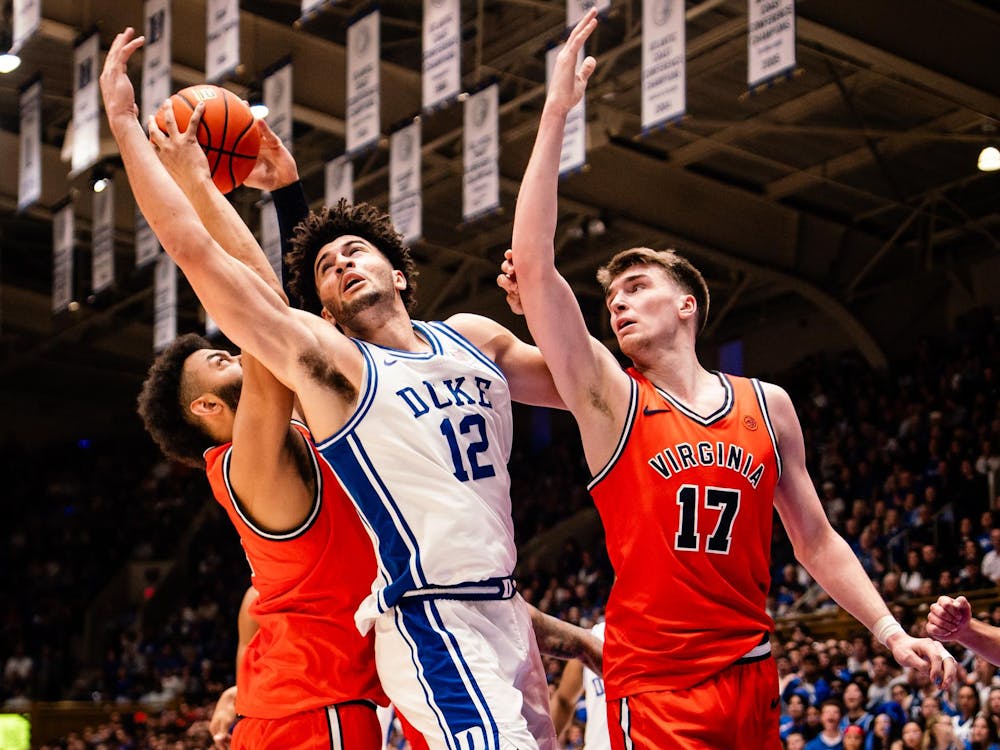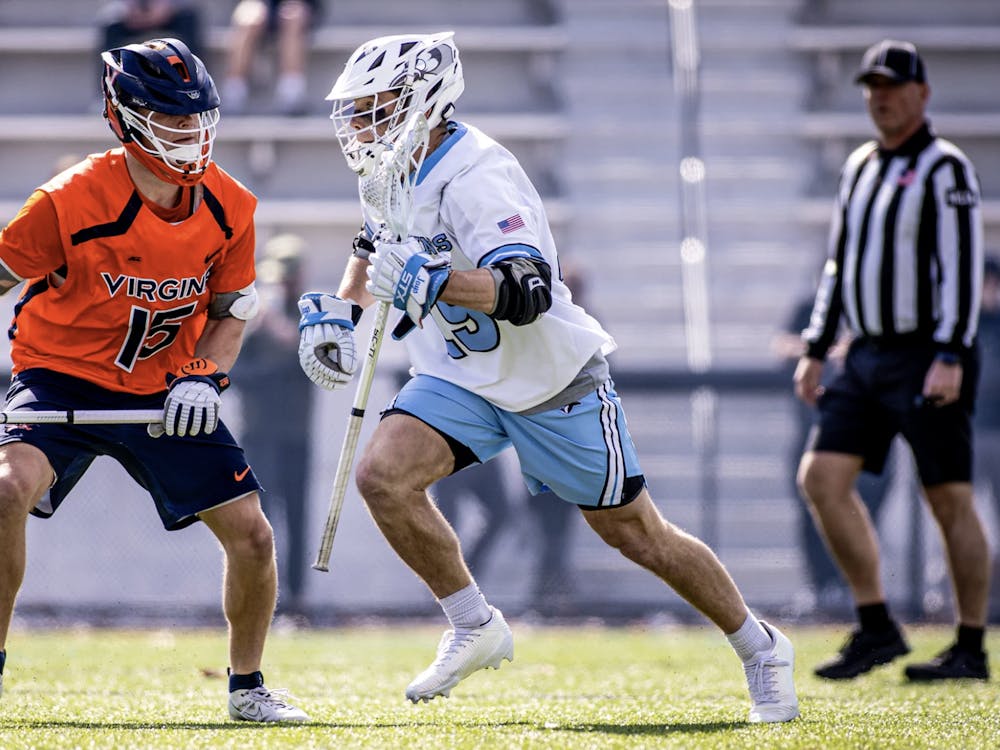It’s the 2016 NCAA Tournament, and the Virginia Cavaliers are rolling.
After dismantling Iowa State in the Sweet Sixteen, the No. 1-seed Cavaliers are dominating No. 10-seed Syracuse in their Elite Eight matchup, well on their way to their first Final Four berth since 1984.
Malcolm Brogdon has just found London Perrantes for a deep three from the top of the key, and Virginia is up 54-39 with under 10 minutes to play.
But from that moment on, everything went wrong. Syracuse, behind hot three-point shooting and full court pressure, overcame a double-digit second half deficit to upset the Cavaliers and advance to the Final Four.
Defeat seemed inevitable as soon as the Orange gained the lead, a feeling that has become all too common among Cavalier faithful. The Cavaliers’ inability to make comebacks has hurt them in high-intensity games, especially in March.
Virginia’s next two runs in the tournament exposed the same fatal flaw.
In 2017, the Cavaliers fell to Florida, unable to counter the Gators’ momentum after a scoring flurry at the end of the first half. In 2018, after a historically dominant season in which Virginia won both the ACC regular season title and conference tournament, the Cavaliers ended their season with a historic loss to No. 16-seed UMBC. Again, they failed to mount a comeback after UMBC took the lead in the second half.
This year’s Cavalier team, however, is different.
Now, in addition to the ability to crush opposing teams’ wills through the packline defense, the Cavaliers have shown an ability to make comebacks, which will prove to be crucial down the stretch.
The 2018-19 Cavaliers are really good and resilient. Virginia certainly has demonstrated this in bouncing back from their loss against UMBC, coming up with yet another stellar season. Beyond that, they have showed resilience in individual games — this year’s Virginia team has made some impressive comebacks and has had several gritty wins in close games.
Against VCU, Virginia was facing a serious scare at home early in the season, down by five points with less than seven minutes to go. The Cavaliers, however, came back to win by eight points.
Against N.C. State, Virginia had squandered a double-digit lead on the road and appeared to be in danger of defeat. The Cavaliers, however, grinded out the win in overtime.
Against North Carolina Monday, Virginia fell behind by seven points with less than eight minutes to play in a hostile road environment. The Cavaliers, again, proved their mettle down the stretch, mounting an impressive comeback to take down the No. 8 Tar Heels. Virginia didn’t panic as North Carolina got hot, patiently whittling away at the Tar Heels’ lead through solid defensive possessions and excellent offensive plays.
“We just kept challenging,” Coach Tony Bennett said. “Hang in there, get a stop. You're still in it. Ty [Jerome] said to relax. I thought we had some tough stretches and Carolina did some good things, of course. But, when you have a guy like Kyle [Guy] … Guy’s just made some plays.”
Even in their losses, the Cavaliers have shown resilience.
Against No. 2 Duke, despite a red-hot start from the Blue Devils in which they started the game shooting 7-8 from three-point range, the Cavaliers hung in and made it a game, ending the first half on an 11-3 run.
This year’s Virginia team has the same composure and toughness as past Bennett teams, but also has a unique quality of resilience, the result of a newfound motivation developed from past collapses, exceptional offensive talent and flexibility and unparalleled team unity.
The vast majority of Virginia’s players remember the loss to UMBC and know that the Cavaliers have generally come up short in March. This has made this year’s team uniquely hungry — it possesses a sense of urgency.
Guy’s Twitter profile picture depicts a motivating force behind this urgency. The guard is pictured bending down in defeat, hands on his knees, with UMBC players celebrating in the background. He and his teammates have turned the loss into a source of resilience.
“We know we’ve been vulnerable and now we can really move past it and get to March again, which is the ultimate goal, and just play our best and leave everything on the floor,” Guy said at ACC Media Day.
Beyond the memory of defeat and a clear sense of urgency, this year’s Virginia team is really good on offense. Whereas in the past the Cavaliers had to rely on defense to quell momentum, this year Virginia can use offense as a run-stopper.
This was clear in the North Carolina game. Guy’s three-pointer, with Virginia down seven points, sparked a 7-0 run that tied the game.
The numbers are clear — this is statistically the best offensive team ever under Bennett. This year’s team is averaging the most points per game, 72.6, of any Bennett team. The 2015-16 team led by Brogdon is the only team that comes close to that average, with 70.4 points per game. In addition, Virginia currently ranks fifth-best in the nation in KenPom.com’s measure of adjusted offensive efficiency, the best ever for a Cavaliers’ team.
The Cavaliers have a legitimate big three — Guy, Jerome and Hunter — who are each averaging over 13 points per game. Having the flexibility of multiple scorers, rather than dependence on a go-to guy, makes Virginia’s offense especially dangerous.
Instead of relying on primarily one scorer — like Brogdon in 2016 and Perrantes in 2017 — to stop momentum, the run-stopping shot can come from anywhere on this Cavaliers’ team. This, combined with several other players who have the potential to go off — Mamadi Diakite has scored 18 points in two games, Braxton Key went off for 20 points against then-No. 9 Florida State and Jay Huff has come up with multiple game-changing plays — gives Virginia the ability to overcome deficits.
Additionally, Bennett’s increasing flexibility on offense late in games has led to easier momentum-building, with players like Jerome and Hunter able to create one-on-one off the dribble. This was on full display against North Carolina. Although the mover-blocker is still the staple of the Cavaliers’ selfless, efficient offense, Bennett has been willing to make adjustments.
The final factor that has made this bunch so resilient is their unity. While this is probably not unique to this Virginia team — after all, unity is one of Bennett’s five pillars — it is undeniable that the togetherness of this year’s team has been exceptional.
“We get breakfast together,” junior guard Ty Jerome said. “We get dinner together. When something goes wrong, we fix it together. We lose together, and we win together. That’s just who we are.”
As time ticks down in the regular season and the postseason looms, the Cavaliers will undoubtedly meet adversity. They will greet it with resilience.







